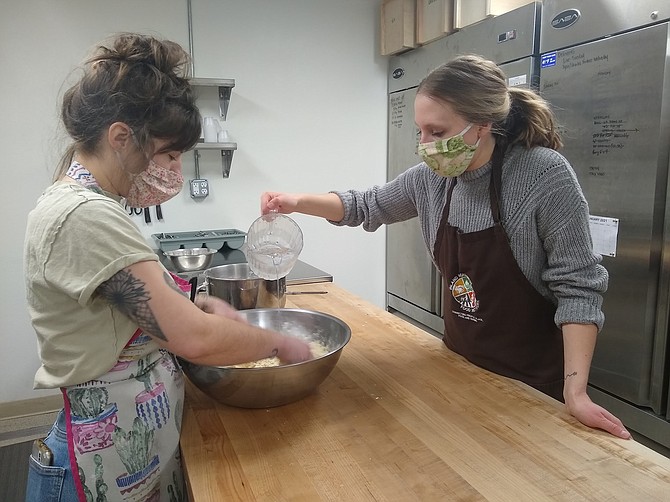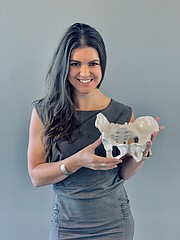New businesses thrive despite pandemic

Baking manager Kendall Fetzer and owner Katy Bean test recipes for Bean & Pie's Valentine's Day menu.
By the time Katy Bean opened a brick-and-mortar store in early 2020, she had been in business for years.
She and her husband, Ethan, had baked pies out of their kitchen and sold them at farmer’s markets and pop-up events since 2017. Before long, they were ready to expand their business, which they called Bean & Pie, but lacked funding.
Bean launched a Kickstarter campaign in November 2018 with the goal of raising enough money to open a shop.
“It was the scariest thing I’d ever done,” she said. “This was all or nothing.”
Within 24 hours, the campaign had raised $10,000 — half the funding goal. Backers contributed more than $21,000 total.
For Bean, the Kickstarter was a testament to what she’d built: a business centered on community.
“All these people we had met at our events and built relationships with showed up,” she said.
In early 2020, Bean & Pie moved from a home kitchen to 504 E. Sherman Ave. During the shop’s grand opening on Feb. 28, a line of customers wrapped around the building for hours.
“The whole community showed up for us,” Bean said. “We were on cloud nine.”
Less than two months later, the world changed.
To help protect her employees and customers, Bean decided to close her lobby in March. It was an unexpected blow to the fledging business, but after all she’d been through just to open her doors in the first place, Bean was determined to find a way forward.
“I wasn’t going down without a fight,” she said.
She had to change her business model practically overnight. Though she had an online presence, Bean said she wasn’t initially set up to do the bulk of her business through her website.
She had to adapt on the fly, transitioning to online orders and curbside pickup.
“It was more about survival,” she said.
Once again, Bean & Pie’s loyal customers came through.
“People really got behind that and supported our online ordering system,” Bean said.
Jamie Morgan, a digital marketing specialist with the Small Business Development Center at North Idaho College, said the challenges Bean faced were common.
Many businesses in North Idaho relied on foot traffic from locals and tourists alike, much of which dried up when the pandemic necessitated closing physical storefronts. All at once, online stores became a lifeline.
“When you have to shut down and the only way you can interact is online, businesses kind of panicked a bit,” Morgan said.
In the early days of the pandemic, physical therapist Laura Steiniger found herself unsure how to proceed in rapidly changing circumstances.
She opened her clinic, Inland Pelvic Health & Physical Therapy, in late January 2020. About a month and a half later, COVID-19 forced her to close her office.
Though telehealth visits became commonplace due to the pandemic, long-distance physical therapy was a challenge. Steiniger knew she had to find another way to connect with patients.
While her office was closed, she networked with other providers, including midwives, obstetricians, gynecologists and others.
She hosted virtual meetings with local doulas and midwives where she spoke directly to women about pelvic health.
“There were so many virtual units where I was teaching, sitting in front of a computer with my pelvic model,” she said with a laugh.
Word got around, and when Steiniger’s office reopened in May, business boomed. She soon hired an intern, a clinic manager, two physical therapy assistants and a receptionist.
“I need more help already,” she said.
Steiniger said the circumstances that forced her to rethink how she approached her business turned out to be a blessing in disguise.
“Creating this network has been so empowering for me and my staff,” she said. “We had to create new ways to reach out to the community. That’s not going to change now.”
Finding a niche like Steiniger did was key for many businesses. Jamie Morgan pointed to a client who owned a restaurant and developed a plan for prepared meals through her website.
“That became her signature thing,” she said.
Morgan said NIC’s Small Business Development Development Center, which offers free business coaching, training and resources for entrepreneurs and individuals, saw an influx of new clients in 2020. Many were looking for guidance as they navigated the challenges of running a business during a pandemic.
“Businesses come to us at all stages,” she said. “Many people had to go online in 2020. We can help walk them through all those steps.”
Like Steiniger, Bean said she expects some of the pandemic-era changes she made in 2020 to be permanent. Customers have responded positively to convenient online ordering options and curbside pickup.
“We’re looking for ways to continue to serve people in the way they want to be served,” she said.
For Bean, adapting in order to provide her customers with the best possible service is key — pandemic or no pandemic.
“That we even had an opportunity to be here is because of the community,” she said. “That’s what matters most to us. I never want to take it for granted.”













